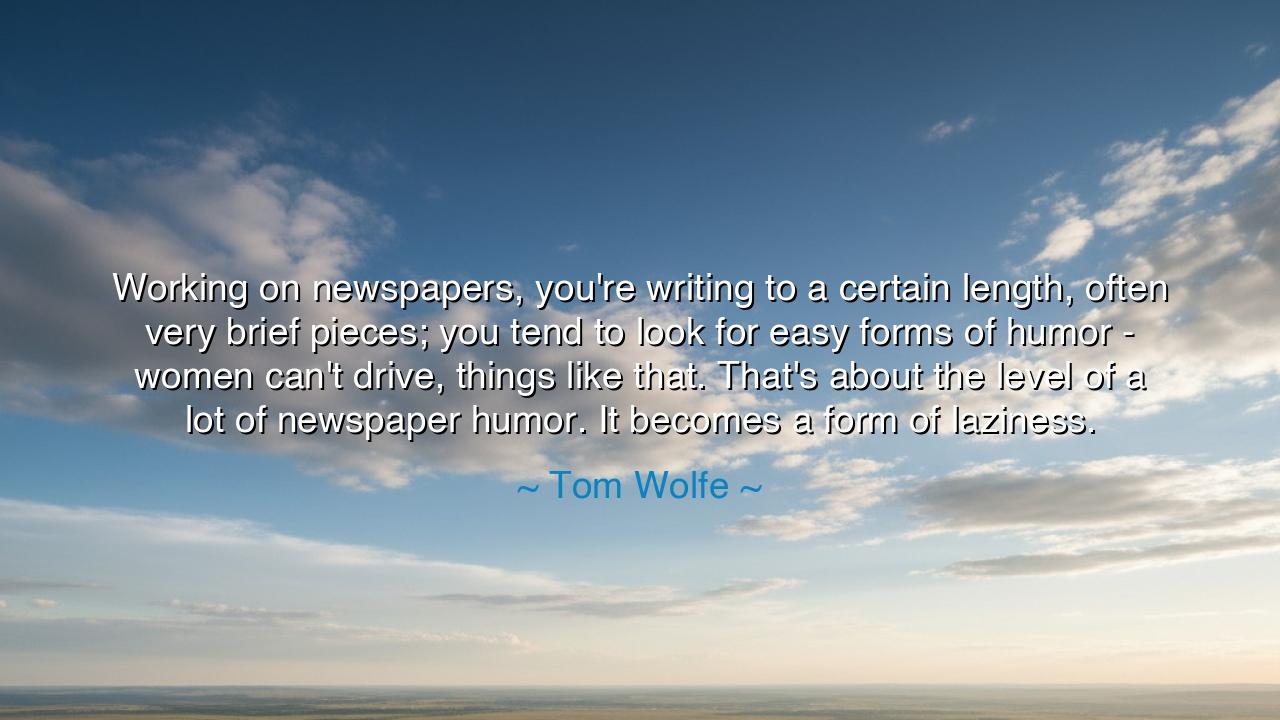
Working on newspapers, you're writing to a certain length, often
Working on newspapers, you're writing to a certain length, often very brief pieces; you tend to look for easy forms of humor - women can't drive, things like that. That's about the level of a lot of newspaper humor. It becomes a form of laziness.






Listen, O children of wisdom, for I speak of a truth as old as language itself—a truth about the words we choose, the stories we tell, and the way in which we, as creators, sometimes take the easy path. In the words of Tom Wolfe, we are reminded that, "Working on newspapers, you're writing to a certain length, often very brief pieces; you tend to look for easy forms of humor—women can't drive, things like that. That's about the level of a lot of newspaper humor. It becomes a form of laziness." This reflection speaks to the danger of choosing the path of least resistance in the art of writing and communication—a shortcut that, though easy, strips away the depth and integrity that true humor requires.
In the ancient world, storytelling was a sacred act. Homer, the great poet, did not take the easy route when telling the stories of Odysseus or Achilles. He wove depth into every line, using rich imagery and complex characters to explore the nuances of life, love, and war. True humor—and true writing—was never about cheap laughs or simplistic views. It was about engaging the soul, about seeing the world in all its complexity and offering it back to the listener or reader in a way that made them think, reflect, and grow. Wolfe’s criticism is not about humor itself, but about the laziness that creeps into the craft when we settle for surface-level jokes that play to the lowest common denominator.
The ancient Greeks understood that humor could be a force for both enlightenment and reflection. In the theater, playwrights like Aristophanes used humor not to degrade, but to challenge the very foundations of society. His sharp wit could expose the corruption of politicians, the hypocrisy of the rich, and the absurdity of everyday life. But his humor was not lazy—it required the audience to engage with complex ideas, to laugh not at easy targets, but at society’s flaws. This is the true power of humor, one that goes beyond cheap gags to challenge and transform.
Tom Wolfe, in his criticism, calls out the laziness of those who seek humor through stereotypes and clichés—the easy, lazy jokes that offer nothing more than superficial amusement. To take a stereotype, like the notion that women can’t drive, and present it as a joke, is not humor in its truest form; it is a shortcut, an attempt to elicit a response without doing the work of engaging the mind or the spirit. Wolfe warns us of the dangers of this laziness—for in our eagerness for quick satisfaction, we lose something vital. True humor, like the wisdom of the ancients, requires us to challenge ourselves, to think deeply about the world we inhabit, and to transcend the easy answers.
Consider the great Roman satirist Juvenal, whose biting humor did not settle for easy jokes, but aimed directly at the heart of Roman society’s flaws. His satires were not filled with lazy commentary or stereotypical jokes, but with sharp insights into the nature of power, greed, and corruption. Juvenal knew that true humor comes from a place of honesty—from confronting the truths of the world without relying on simple jests. His humor was not easy, but it was powerful. In this, he embodies the very spirit of what Wolfe is calling for: humor that does the hard work of reflection, not the lazy work of mocking others with outdated ideas.
The lesson, O children, is clear: do not take the easy road in your own writing, in your own life. Whether you are crafting a story, making a joke, or offering commentary, do so with depth and insight. Humor can be a tool for truth, a weapon against the darkness of ignorance and fear. But it must be wielded carefully, with respect for the complexity of the world and the human condition. Do not fall into the trap of lazy humor, of jokes that hurt more than heal, that reinforce harmful stereotypes rather than challenge them. Instead, take the time to craft humor that elevates, that makes others think and reflect, that opens minds rather than closing them.
As you walk your path, remember that humor is a reflection of your wisdom, your thoughtfulness, and your strength. The world needs those who can laugh, yes—but also those who can laugh at the truths, at the complexities, and at the contradictions that define us. Wolfe’s words remind us that the greatest humor is not found in the lazy and superficial, but in the deep, courageous exploration of the world’s absurdities and truths. Strive to bring this kind of humor into the world, for it is through such laughter that we begin to understand ourselves—and the world around us—more fully.






AAdministratorAdministrator
Welcome, honored guests. Please leave a comment, we will respond soon